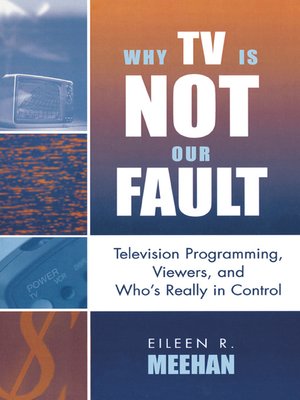Why TV Is Not Our Fault
ebook ∣ Television Programming, Viewers, and Who's Really in Control
By Eileen R. Meehan

Sign up to save your library
With an OverDrive account, you can save your favorite libraries for at-a-glance information about availability. Find out more about OverDrive accounts.
Find this title in Libby, the library reading app by OverDrive.



Search for a digital library with this title
Title found at these libraries:
| Library Name | Distance |
|---|---|
| Loading... |
For more than five decades, we've been told by pundits, commentators, advertisers, scholars, and politicians that television is both a window on the world and a mirror reflecting our culture. We've been led to believe that it shows us the world's events through news programs and, through entertainment programs, reflects the preferences, values, beliefs, and understandings shared by most Americans. We're told that if you don't like what you see on TV, don't blame the industry, blame yourself.
This book dispels the myth that the television industry is just giving viewers the programming they want to see and, thus, we as viewers are "responsible" for the existence of shows like Fear Factor and yet another Survivor. In fact, Eileen Meehan explains, viewers exert no demand in the market for ratings, advertising slots, program production, or telecasting. She also counters the idea that TV programs reflect our culture directly. Introducing us to the political economy of television, Meehan covers programming, corporate strategies, advertising, the misnomer of "competition" among networks, and organizations that seek more industry accountability. She tells us why TV isn't our fault—and who's really to blame.
This book dispels the myth that the television industry is just giving viewers the programming they want to see and, thus, we as viewers are "responsible" for the existence of shows like Fear Factor and yet another Survivor. In fact, Eileen Meehan explains, viewers exert no demand in the market for ratings, advertising slots, program production, or telecasting. She also counters the idea that TV programs reflect our culture directly. Introducing us to the political economy of television, Meehan covers programming, corporate strategies, advertising, the misnomer of "competition" among networks, and organizations that seek more industry accountability. She tells us why TV isn't our fault—and who's really to blame.







